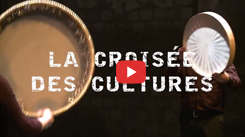The Ateliers d’ethnomusicologie shines a bright light on the value of humanity’s cultural patrimony by cultivating links with artistic practices from across the globe. Taking shape over the course of centuries, these constantly evolving practices bare witness to the history of various peoples, their vitality, their influences and the encounters that have marked them. The numerous contemporary approaches inspired by traditional arts demonstrate how these practices are an inexhaustible inspiration for the present time.
In this twenty-third edition of the Croisée des Cultures the polyphonic songs and complex rhythms of Bulgaria are exposed to gypsy repertoires from the Balkans and Turkey, and shows that these traditions, just like the gypsy flamenco of Andalusia, have been informed by their encounters with a variety of artistic practices over the course of their migrations. Not to mention the Buddhist singing tradition shômyô, which originated in India and was codified in Japan around the ninth century after having crossed China.
Africa is represented by Zulu dance, South African gumboot dance, the dances of the Khassonke people of Mali, as well as the polyphonies of central Africa and their influence on gospel and jazz. Sufi dance and Egyptian percussions round off our look into this great continent.
As for the children, they will be transported across the globe on a five-day programme of discovery, involving music, dance, fine arts and food, and even a bit of botany.
And all of these wonderful people – whether small or grown up; beginners, passionate amateurs or professionals; regulars or first-timers – they can meet each other at a shared meals, at festive occasions and demonstrations which fill the small, warm and convivial village of the Parfumerie during the week.
Astrid Stierlin




